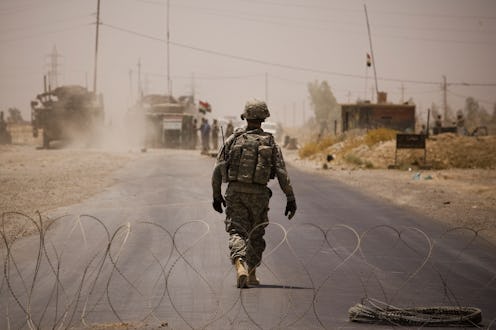News
U.S. Troops Were Exposed To Chemical Weapons
A comprehensive multimedia report produced by The New York Times revealed late Tuesday that U.S. and U.S.-trained Iraqi troops were repeatedly exposed to chemical weapon caches, which remained from earlier days of Saddam Hussein's rule. On at least six occasions confirmed by the Times, soldiers were wounded by mustard or nerve agents. Rather than receiving proper medical treatment or even recognition for their role, the soldiers' dangerous military operation has remained a closely held secret.
Published Tuesday, the 8,500-word story details years of secrecy from the American-led operation to locate and destroy long-abandoned chemical weapons. Details of these operations were kept from Congress and, even more disturbingly, from the troops carrying out the missions. While the government held that the chemical weapons no longer posed a threat, the 17 people identified by the Times who had been exposed to nerve or mustard gas since 2003 stand in sharp contradiction to this claim. The government's refusal to tell troops or even military doctors about the chemical weapons hunts left exposed troops unable to receive proper treatment for injuries.
One unidentified former Army sergeant told the Times that after suffering burns from mustard gas, he was denied a medical evacuation and hospital treatment from the U.S. Another, retired Army major Jarrod Lampier, was ordered to say that he had found "nothing of significance" while out hunting chemical weapons. Lampier was there for the biggest discovery of chemical weapons: 2,400 rockets.
Much of the territory where the weapons were located is now controlled by the militant group ISIS, including the now decimated Al Muthanna State Establishment. The Iraqi government said in June that 2,500 chemical rockets were left on the grounds of the former chemical production agent center.
Now that ISIS controls the area, there is fear that the corroded munitions could be repurposed into bombs, a tactic that was used by Iraqi insurgents. While many of the chemical weapons were destroyed, sources told The New York Times that many munitions remained.
So why did the military keep this a secret? Embarrassment, for one. The Bush administration would have loved to have evidence that Hussein was using chemical weapons to further justify its weapons-of-mass-destruction war. But the chemical munitions they found couldn't give them that justification.
"They needed something to say that after September 11, Saddam used chemical rounds," Lampier told The New York Times. "And all of this was from the pre-1991 era."
American assistance with the production of these weapons could also be a rationale for remaining tight-lipped. Troops sustained wounds from chemical weapons that, at least in part, the U.S. helped manufacture.
If we never know the exact reasoning for this dangerous cover-up, we do know for certain that it has already wreaked havoc on the lives of troops who deserve proper recognition, care, and respect from the government that they are serving.
The Times' reporting has at least prompted some action already. "We’re at the point of wanting to make this right," Col. Bill Rice, director of Occupational and Environmental Medicine of the Army Public Health Command told the Times the Friday before the story released. "We can’t change the past, but we can make sure they are pointed in the right direction from this point forward."
But even beyond this flout of human decency, there's another problem. The Iraqi government was ordered to destroy the chemical weapons, and plans were drawn up to entomb Al Muthanna in concrete. But it never happened. And as for today, as the the Times ominously concludes in its story, ISIS now controls the compound.
Images: Screenshots/The New York Times
